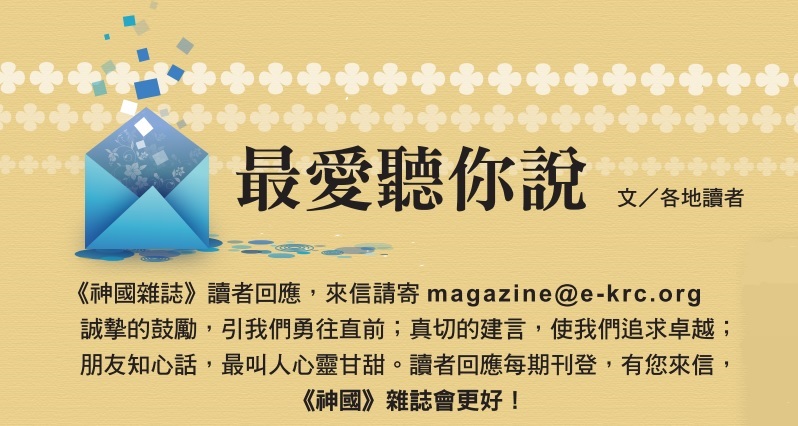【I love listening to you most】
Responses from readers of Kingdom of God Magazine

回應59期〈Hong Kong Church in the Political Whirlpool〉
香港教會目前面對的政治紛擾,有評論員形容為四化:兩制一國化、西環(「中聯辦」1在香港辦事處地區)治港常態化、意識形態大陸化、治港班子左派化。香港教會過往未經歷過如此窄化的對立面,何去何從?或者從教會歷史的回顧中,我們可得啟迪。
From political and religious independence to contemporary dialogue
香港教會必須謹記過去中國教會與社會的互動中,有時只是因遲疑或不願表態,便會失去世代對話機會。例如在五四運動期間,很多知識分子都爭相擁戴理性與科學精神,對宗教開始大舉排斥。可惜,教會面對當代的否定論2、蔡元培、胡適的取代論3、陳獨秀的選取論4、梁漱溟的二元論5時,大部分退回教堂的四壁內,鮮有積極回應,以致中國知識界所建成的反教堅強堡壘,一直到今天仍有影響力。
On the other hand, many churches throughout the ages have been dominated by raging nationalism outside the church. It was before World War II that the German church fell into the strong patriotic sentiments incited by Hitler, which resulted in it losing its critical power derived from the Bible and allowing the dictator to massacre Jews indiscriminately. At this moment, is the Hong Kong church singing red songs along with the city while ignoring the dominant godless melody?
From neutrality to pluralistic discussion
After Hong Kong's return to the motherland, the mentality of masses fighting against masses has repeatedly emerged in society. In many cases, church leaders have avoided talking about it in order to avoid sharp confrontations. However, this superficial "river crab" (harmony) will only lead to the loss of most young people who hold dissent. True harmony encourages listening, tolerance, and acceptance in diversity. If the church chooses to be silent in this great era, why is it still asking why there is no Timothy? It would be better to explore where Paul, Timothy’s master, was.
From obedience to power in the powerless
Even if the church can distinguish when to obey people and when to obey God, how can the church disobey orders if it has no power?
Take a look at the St. Nicholas Church under the iron heel of East Germany in the past. Since the secret police held regular meetings at 5 p.m. every Monday, the church began to hold prayer meetings during this period in 1982. Later, in 1989, believers took to the streets to demonstrate for reform after prayer meetings. They were suppressed many times, but instead inspired people across East Germany to rush to participate. In the end, these continuous prayer meetings and marches actually caused the Berlin Wall to fall.
The practice of the church lies in defeating the strong with the weak, guarding the conscience, and becoming the treasure in the earthen vessel. (Refer to 2 Corinthians 4:7-11)
(USA, California, Tan Ruiling)
Notes
1. Liaison Office of the Central People's Government in the Hong Kong Special Administrative Region.
2. Completely deny religion, considering it to be anti-science and superstitious.
3. Cai Yuanpei replaced religion with aesthetics, while Hu Shi used morality-building character and meritorious deeds-making contributions to the country and society and establishing a reputation-writing immortal works to influence future generations.
4. Chen Duxiu proposed to choose the benevolent part of religion and abandon the supernatural part of religion.
5. Liang Shuming suggested using the ethical sensibility of religion and at the same time incorporating the knowledge of science.
Thoughts after watching "The Distance Between Us and Evil"
59期滋恩所寫Thoughts after watching "The Distance Between Us and Evil",深刻、生動,深得我心。它不同於過去一般的電視偶像劇或傳統家庭劇,深度探討當媒體呈現新聞事件時,可能著重於報導事件本身,卻常忽略了事件核心中的「人」。
"He who is without sin among you, let him first cast a stone at her." (John 8:7) If you want to end sin, if you just stop at throwing stones at sinners, can you eradicate the source of sin?
Christians are not necessarily farther away from evil than unbelievers. In this world, the shadow force of evil is everywhere, and no one can completely escape its control by his own strength. Only through union and protection with the Lord Jesus can we overcome.
(Taiwan, Hsinchu, Jiao Feng)
